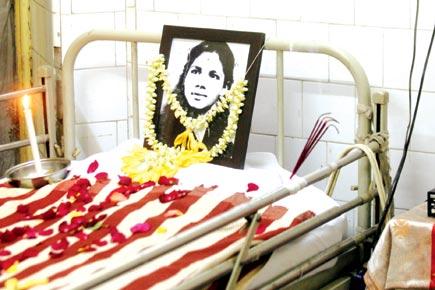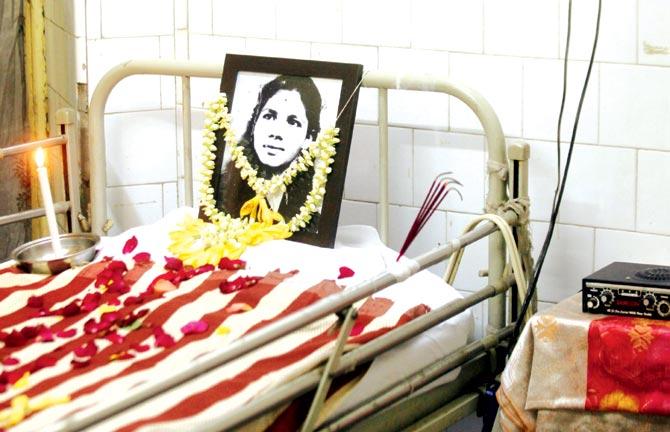The Aruna Shanbaug case has highlighted many deep flaws in Indian society. First, hardly anyone has acknowledged the fact that Shanbaug was, in fact, a whistle blower. Nobody has celebrated her courage and martyrdom for a higher cause; she is seen mainly as a rape victim

Aruna Shanbaug died after being in coma for 42 years at KEM Hospital on May 18. File pic
 The Aruna Shanbaug case has highlighted many deep flaws in Indian society. First, hardly anyone has acknowledged the fact that Shanbaug was, in fact, a whistle blower. Nobody has celebrated her courage and martyrdom for a higher cause; she is seen mainly as a rape victim.
The Aruna Shanbaug case has highlighted many deep flaws in Indian society. First, hardly anyone has acknowledged the fact that Shanbaug was, in fact, a whistle blower. Nobody has celebrated her courage and martyrdom for a higher cause; she is seen mainly as a rape victim.
The former KEM Hospital nurse died earlier this week, after 42 years in a vegetative state. Her fellow nurse, Pratibha Prabhu, told DNA, "She used to complain against Class IV workers who did not do their jobs well. She always said that they must be held accountable," adding that Shanbaug's complaints had made one of the ward boys vengeful — and she paid for it with her life. Shanbaug died fighting for a larger cause-accountability to patients by Class IV workers.
ADVERTISEMENT
Second, there was no FIR for rape. Ward boy Sohanlal Walmiki raped and sodomised her, and strangled her with a dog chain, leaving her permanently in a vegetative state. After serving two seven-year concurrent sentences for attempt to murder and robbery, he walked free. Although it was a case of brutal sexual assault at the workplace, none of Shanbaug's doctor or nurse friends filed an FIR for rape. Pinki Virani, author of Aruna's Story — who moved the Supreme Court, making a case for euthanasia —wrote, "I asked all the doctors and nurses to at least come file an FIR. They all refused. Finally, a police officer agreed." The policeman filed an FIR — apparently brave enough, when those closest to her would not-but his charges left out rape, sodomy and molestation, and instead, he went after the earrings and assault.
Aruna Shanbaug died after being in coma for 42 years at KEM Hospital on May 18. File pic
Third, why should victims of crimes feel shame, not their perpetrators? According to some versions, the rape charge was dropped to avoid shame, in case Shanbaug recovered and got married. Likewise, her family abandoned her after she was hospitalised in a near-vegetative state. I am nobody to judge anybody, and my deepest condolences to Shanbaug's family and the KEM hospital staff. But I wonder, if she had been paralysed following, say, a 'non-shameful' car accident, would all her eight siblings still have abandoned her? This being India, the victims of crimes and their families often feel shame; the perpetrator need not-look at the spectacular support Salman Khan got when convicted for killing a homeless man.
Fourth, why does our upbringing teach men that rape is OK? As with the Delhi gangrape and similar cases, the reasons include patriarchy, machismo, a sense of power over a helpless person, caste thuggery, and revenge for a situation in which the perpetrator sees himself as slighted or as a victim. But none of these justify rape. Fifth, I believe the deeper roots of rape are socio-economic-unchecked population and unchecked parenting. No government has addressed curbing population growth in decades. Two of life's biggest traditional responsibilities — marriage and having children — require no qualifications or accountability at all. You want? Gheoon tak!
Parenting is often timepass (sure, there are obsessive parents too). Parents often exploit their own children, seeing them as an 'investment' or old age pension. They routinely dump their parenting responsibilities on their children, force them to earn and look after their families, and thrash or abandon them if they don't. In the film India's Daughter, Delhi gangrape convict Mukesh Singh's mother openly admits, "Isn't this why everyone raises children? To look after us in our old age?" Why would children of such parents grow up with values any different from those of their parents? The cycle of violence and exploitation will continue. And it's not just the poor. Amitabh Bachchan, playing the patriarch of a rich, chandeliered family in Baghban, proudly declares: "My sons are my four fixed deposits."
Time magazine had once reported that in the US, in order to stem unwanted, teen pregnancies, teenagers in late school and college were assigned to assist in looking after other people's newborns for extended periods. They were so sick of the constant wailing, feeding, pissing, shitting, fevers and awake-at-night routine, it gave them an early sense of parental responsibility, and apparently had a sobering effect on the decision to have children.
The Catholic Church organises marital counseling sessions before a couple gets married (and after), where thorny issues like parenting responsibilities, sex and financial issues are sorted out. Hindus are largely content with a token wail of "Savdhan!" (caution) a few seconds before the wedding is solemnised. Finally, it is heartening how the kindness of strangers can often redeem your fate, even when your family abandons you. In Shanbaug's case, 1,150 nurses "got a chance to serve her," and as nurse Anuradha Padhare told the press, "We were her guardians, as her family refused to take her home. We were her only family."
Meenakshi Shedde is South Asia Consultant to the Berlin Film Festival, award-winning critic, consultant to festivals worldwide and journalist. She can be reached at meenakshishedde@gmail.com
 Subscribe today by clicking the link and stay updated with the latest news!" Click here!
Subscribe today by clicking the link and stay updated with the latest news!" Click here!







